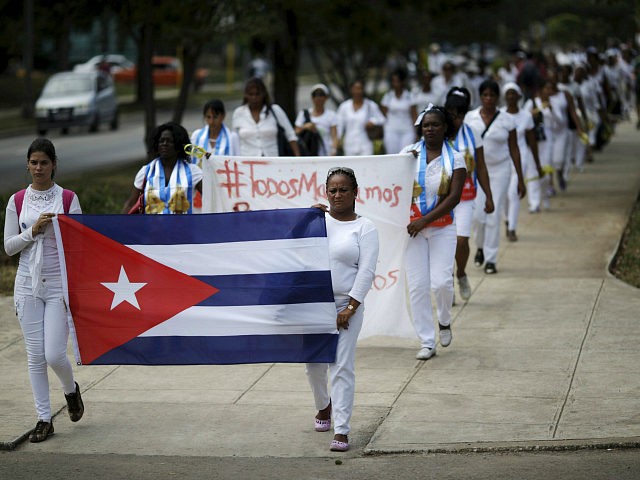The U.S. State Department has revealed persistent persecution of Christians in Cuba in its 2016 religious freedom report released Tuesday, highlighting actions to suppress Christian dissident group the Ladies in White in particular and the use of state bureaucracy to prevent the spread of the faith.
The report, which analyzes the state of religious freedom throughout the world, notes that religious leaders who do not promote the communist Cuban revolution face “threats, detentions, and violence,” and those who actively advocate against the Castro regime face arrest and torture.
While Cuba is home to a small minority of Jews and Muslims, most who identify with a religion are Catholic, with a minority of Protestant Christians. As a Marxist state, Cuba does not have a state religion and uses its Office of Religious Affairs (ORA) to use churches to promote the government and suppress the growth of any church explicitly concerned with practicing Christianity. According to the report, those linked with anti-communist dissident groups were particularly in danger of harassment:
Religious and human rights groups stated that the government harassed and detained outspoken religious figures, especially those who discussed human rights or collaborated with independent human rights groups. Government security forces took measures, including detentions that were sometimes accompanied by violence, which inhibited the ability of members of the peaceful protest group Ladies in White to attend Catholic Mass.
The Ladies in White are a Catholic group of relatives of political prisoners whose sole act of defiance against the state is to attend Catholic Mass on Sundays dressed in white and holding flowers and a photo of their imprisoned loved ones, demanding they be released. Every Sunday, Cuban state police hurl insults at the women, beat them, shove them into state vehicles and drive them hours away from their homes with no way to return. This Sunday, 50 women were arrested nationwide attempting to reach a church to practice their faith.
The Ladies in White are not alone in their struggle to organize. Among the most prominent political prisoners on the island is Eduardo Cardet, the head of a dissident group called the Christian Liberation Movement (MCL). Cardet was sentenced to three years in prison in March after refusing to sign a “condolence book” for Fidel Castro following his death in November. Police claim he was violent towards them, but eyewitnesses—including his wife and children—deny the allegations. Cuban authorities routinely claim that peaceful dissidents have acted violently against them.
Christians who are not actively part of the dissident community face intense scrutiny as well, as the state appears to fear the spread of Christian beliefs that could rival idol worship of Fidel Castro, Ernesto “Che” Guevara, and other gods of the state faith. The State Department report quotes a researcher working on the study, stating that “all believers are monitored and all church services are infiltrated by informers,” to ensure the churches promote loyalty to the Castro family. Those who do not are arrested, their services shut down.
The result has been a freezing effect on religious speech in Cuba. According to the State Department, “many religious leaders stated they stayed away from overtly political topics. Some said they feared their direct or indirect criticism of the government could result in government reprisals, such as denials of permits from the ORA, dismantling of religious buildings, or other measures that could limit the growth of their religious groups.”
Shortly after the release of the global study on religious freedom, the Cuban-American news outlet Martí Noticias published a report on religious freedom from the ground in which religious leaders protest the government’s insistence on suppressing faith.
“There is no religious freedom, merely religious tolerance that is based in, if you don’t get into anything that they understand to be dangerous to their system, you can go to the streets to proselytize,” Chrisitan leader Félix Llerena López told the outlet.
Pastor Manuel Morejón Soler, meanwhile, notes the total absense of religious freedom when it comes to education. Cuba forces all children to attend public schools, where they learn alternative histories masking the abundant human rights crimes in the history of the Castro regime. “We demand an alternative education, as there always was,” Morejón told the outlet.

COMMENTS
Please let us know if you're having issues with commenting.